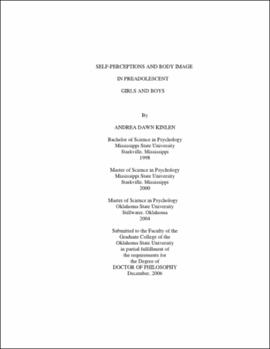| dc.contributor.advisor | Page, Melanie C. | |
| dc.contributor.author | Kinlen, Andrea Dawn | |
| dc.date.accessioned | 2013-11-26T08:27:41Z | |
| dc.date.available | 2013-11-26T08:27:41Z | |
| dc.date.issued | 2006-12 | |
| dc.identifier.uri | https://hdl.handle.net/11244/6953 | |
| dc.description.abstract | Scope and Method of Study: The literature reviewed reveals that body dissatisfaction and weight concerns are experienced by some preadolescent children. Studies in this area also suggest that self-perceptions may influence body image concerns and the development of eating disorders. Therefore, in order to provide further evidence of the association of self-perceptions to body image and eating problems, the purpose of the present study was to assess the relationship of self-perceptions to body image dissatisfaction and eating behaviors in preadolescent boys and girls. Seventy-five children from public schools were recruited, with 64% of the sample girls and 36% of the sample boys. The majority of the sample was Caucasian. Children were administered two body image and eating disorder rating scales and asked to complete a figure drawing task to measure body dissatisfaction. In addition, children completed a self-perception rating scale and were weighed and measured. | |
| dc.description.abstract | Findings and Conclusions: Overall, self-perceptions contributed to the variance in body image concerns. Perceptions of social acceptance were related to body dissatisfaction but not to the restrictive eating or binge eating when controlling for BMI. Physical appearance and global self-worth accounted for a significant part of the variance above and beyond BMI for body dissatisfaction and restrictive eating. Global self-worth was the only factor to account for a significant part of the variance for body dissatisfaction, restrictive eating, and binge eating. Athletic competence did not account for a significant portion of the variance for any of the variables of interest. No significant gender differences were found for body dissatisfaction, restrictive eating, or binge eating. The Eating Behaviors and Body Image Test (EBBIT), which was previously created for use with preadolescent girls, was shown to have good internal consistency for use with boys. The body image dissatisfaction/restrictive eating factor of the EBBIT was shown to be a valid measure when compared to another eating disorders measure for children. This lends support for the use of the EBBIT as a reliable and valid measure for assessing body image concerns and eating behaviors in children. The findings point to the use of self-esteem and self-perceptions in assessment, treatment, and prevention of body image concerns and eating disorders. | |
| dc.format | application/pdf | |
| dc.language | en_US | |
| dc.rights | Copyright is held by the author who has granted the Oklahoma State University Library the non-exclusive right to share this material in its institutional repository. Contact Digital Library Services at lib-dls@okstate.edu or 405-744-9161 for the permission policy on the use, reproduction or distribution of this material. | |
| dc.title | Self-perceptions and body image in preadolescent girls and boys | |
| dc.contributor.committeeMember | Sullivan, Maureen | |
| dc.contributor.committeeMember | Chaney, John M. | |
| dc.contributor.committeeMember | Harrist, Ronald S. | |
| osu.filename | Kinlen_okstate_0664D_2123.pdf | |
| osu.accesstype | Open Access | |
| dc.type.genre | Dissertation | |
| dc.type.material | Text | |
| thesis.degree.discipline | Clinical Psychology | |
| thesis.degree.grantor | Oklahoma State University | |
